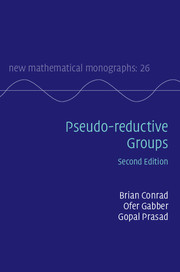Book contents
- Frontmatter
- Dedication
- Contents
- Preface to the second edition
- Introduction
- Terminology, conventions, and notation
- PART I Constructions, examples, and structure theory
- PART II Standard presentations and their applications
- PART III General classification and applications
- PART IV Appendices
- A Background in linear algebraic groups
- B Tits' work on unipotent groups in nonzero characteristic
- C Rational conjugacy and relative root systems
- References
- Index
C - Rational conjugacy and relative root systems
from PART IV - Appendices
Published online by Cambridge University Press: 05 June 2015
- Frontmatter
- Dedication
- Contents
- Preface to the second edition
- Introduction
- Terminology, conventions, and notation
- PART I Constructions, examples, and structure theory
- PART II Standard presentations and their applications
- PART III General classification and applications
- PART IV Appendices
- A Background in linear algebraic groups
- B Tits' work on unipotent groups in nonzero characteristic
- C Rational conjugacy and relative root systems
- References
- Index
Summary
Let G be a smooth connected affine group over a field k. In [BoTi2], Borel and Tits announced (without proof) some remarkable results generalizing important theorems when G is reductive. Among these are the G(k)-conjugacy of maximal k-split k-tori, maximal k-split smooth connected unipotent ksubgroups, and minimal pseudo-parabolic k-subgroups, as well as the Bruhat decomposition for G(k) (relative to a choice of minimal pseudo-parabolic k-subgroup). In this appendix we use §§2.1–3.5 and Appendix B to prove these results, following the ideas outlined in [Ti3, §§2 and 3] (with some scheme-theoretic improvements). We give some generalizations in §C.4 for group schemes locally of finite type over a field. We also develop a theory of k-root systems and associated root groups in smooth connected affine groups over any field k (with results that are most satisfactory in the pseudo-reductive case, eliminating pseudo-split hypotheses from some results in §3.3).
Nothing in this appendix is used in the main text except for Theorem C.2.3 and Theorem C.2.29, which are used in Chapter 9, and the self-contained Lemma C.4.1, which is used in several places.
Pseudo-completeness
We shall prove that the coset space G/P modulo a pseudo-parabolic ksubgroup P satisfies the following variant of the valuative criterion for properness.
Definition C.1.1 A scheme X over a field k is pseudo-complete over k if it is of finite type and separated and X(R) = X(K) for any discrete valuation ring R over k with fraction field K and residue field separable over k.
For any pseudo-complete X, if C is a smooth curve over k and c ∈ C is a closed point such that k(c)/k is separable then any k-morphism C − {c} → X uniquely extends to a k-morphism C → X.
Proposition C.1.2Let X be a scheme over a field k.
- Type
- Chapter
- Information
- Pseudo-reductive Groups , pp. 581 - 655Publisher: Cambridge University PressPrint publication year: 2015



